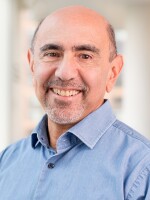STEVE INSKEEP, host:
People in San Francisco did not wait for the Olympic torch to arrive to begin protesting against its final destination. The torch will be carried six miles through San Francisco's downtown today. It's the only North American stop for the torch on its way to Beijing, and anti-China protesters will not miss this opportunity.
NPR's Richard Gonzales reports.
(Soundbite of chanting)
Unidentified Man: (Chanting in foreign language)
RICHARD GONZALES: Just hours before the Olympic torch was set to wind its way through the streets of San Francisco, a group of Tibetan monks and exiles gathered in the city's United Nation's plaza. The Bay Area is home for thousands of Tibetans, many of whom fled their country decades ago. And this week, they've been joined by Tibetans from across the country who have converged on the city to form a major protest against the Olympic torch. They see it as a propaganda tool for the Beijing government.
Ms. TSERING LAMA (Canadian Director, Students for a Free Tibet): And a lot of these people also have family members inside of Tibet still, including myself.
GONZALES: Tsering Lama, a Canadian director for Students for a Free Tibet, says about 2,000 exiled Tibetans are expected for the protest.
Ms. LAMA: So for us to know that the torch - the Olympic Beijing torch is coming here in what we consider our new hometown, our new home country, it's a tremendous opportunity for us to come out and speak out on the streets and ask the San Franciscan people to join us.
GONZALES: Later today, they'll be joined by other activists with a variety of complaints against the Chinese government, from the problems in Tibet to China's dealings with repressive governments in Sudan and Burma.
San Francisco's Board of Supervisors passed a resolution saying the city officials should receive the torch with what the board called alarm and protest. Supervisor Chris Daly sponsored the measure.
Mr. CHRIS DALY (Board of Supervisors, San Francisco): As the eyes of the world are on San Francisco, let's be honest, if there is not alarm and there is not protest in San Francisco when the torch arrives here, that, too, would be news. And that would be San Francisco complicit in the human rights violations that are happening in China and around the world.
GONZALES: But Mayor Gavin Newsom has been urging San Franciscans to separate politics from the Olympic Games. And in recent days, he spent much of his energy urging calm.
Mayor GAVIN NEWSOM (San Francisco): When you hurt someone else, you've lost your moral authority. When you have put someone else in harm's way, you've lost the higher ground.
GONZALES: Newsom also urged protesters not to confuse their criticism of the Chinese government with a judgment of the Chinese people. Those are welcome words among many Chinese-Americans who have felt disrespected by the protesters.
Mr. HENRY DURR(ph) (Community activist): It's not the Chinese torch. It is the Olympic torch. I mean, it's a torch that people worldwide recognize.
GONZALES: Community activist Henry Durr is a prominent critic of the Chinese government's human rights record.
Mr. DURR: We don't always agree on how we look at the Chinese government, but we all recognize that these Olympic Games coming up in August are a testament to what Chinese people are trying to achieve. And for that, I think there's tremendous ethnic pride.
GONZALES: At least one prominent Chinese-American group has pledged to bring out thousands to show their support for the Beijing Olympics. No one is expecting a clash, but officials here hope to avoid a repeat of what happened in Paris, when the relay was disrupted. And Mayor Newsom says the torch route could be altered even at the last minute to prevent problems.
Richard Gonzales, NPR News, San Francisco. Transcript provided by NPR, Copyright NPR.






